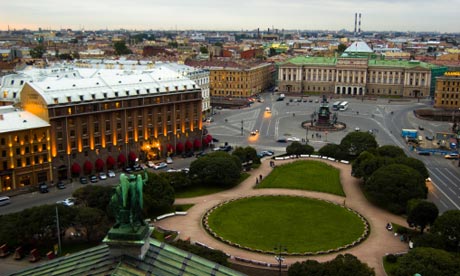
The bride was English, a former student of mine, but she posed for photographs like an archetypal Petersburg beauty at the foot of the Bronze Horseman, Falconet's statue of Peter the Great. It was the midsummer season of white nights, when the sun never fully sets, and we stayed at the wedding party till morning, wandering along the Moika embankment for breakfast at the Hotel Angleterre.
It was all so different from when my husband Marc and I had lived here 15 years before, in the last Soviet winter of 1990 – the city's last as Leningrad – in the first-floor front room of 23 Pochtamtskaya Street (Post Office Street). Then the facades and entryways of Pochtamtskaya's low 18th-century houses were dilapidated, some to the point of ruin. Our room was large and warm, with a Bechstein grand and a theatrical gilt mirror that hung at an ominous 45-degree angle over the bed.
Leningrad State University, where I was enrolled for six months' graduate research, was (like the entire Soviet Union) in administrative paralysis in 1990, and unable to provide accommodation in a student hostel. Through friends, we came to a complicated barter arrangement (rent was still illegal) with a Russian opera singer who was doing a season at Covent Garden, and moved in with his mother-in-law, Irina Borisovna, who was in hibernation. "Why go out? It's still dark!" she would say.
Pochtamtskaya lies on the far side of St Isaac's Square from the Angleterre. Marc and I would cross the square each morning and part outside the hotel. As the sun rose, I crossed the frozen Neva to look at archives in the literary institute, Pushkin House. Marc took the tram down Nevsky Prospect to Lenfilm, where he worked as a legal adviser, translator and "voice-over" ("as an American robot", his employers insisted) for the studio's new English-language commercials.
That winter, the Angleterre was closed for renovation. I longed for it to open. I imagined sitting in a comfortable chair, looking up at the angels on the roof of St Isaac's Cathedral, drinking good coffee from a clean cup. One week, a literary group gathered outside to protest against the gutting of the building. The poet Sergei Esenin – who called himself a hooligan – had hanged himself in room five in 1925, leaving a farewell poem written in his own blood. The poetry-lovers wanted the room preserved in his memory: beams, heating pipes, plaster. Street protests still had an edge of danger then, but when Irina Borisovna saw their earnest placards on the evening news she did not, for once, say "hooligans".
Food was rationed. Our Russian friends worried that we were hungry. I was embarrassed to tell them that for a couple of dollars we could buy enough to last us a week from the gold-toothed Caucasians at the market: fine cuts of meat, cheese, honey and fresh produce. When a friend brought a kilo of beef that her mother had stolen for us from her factory canteen, my embarrassment turned to shame.
Irina Borisovna had many visitors. Old women who had worked with her late husband in the Party came to sit on the divan and watch TV. "How will it all end?" they asked each other. Their sense of apocalypse entered my sensibility and I wrote letters home that must have seemed half-crazed, about some terrible gathering force that would blow everything away.
Before we returned to England in spring 1991, Gorbachev appointed to the Politburo the sinister men who would oust him in a coup that August. He made a paranoid speech about "enemies". People were anxious, and we wrote out visa "invitations" to the UK for Soviet friends and friends-of-friends. In the event, Leningrad, whose citizens had voted in June to give their city back its original name, resisted the coup, under the leadership of their liberal mayor, Anatoly Sobchak, and his canny deputy, Vladimir Putin.
One of Irina Borisovna's friends gave me a fur coat to send from the west to a woman in Israel. She had saved his life in a labour camp, smuggling him leftovers from the camp kitchen. He had dreamed of giving her a fur coat to thank her, he said, but when he could finally afford it, he learned that she had suddenly emigrated. "It's just rabbit fur," Irina Borisovna said after he'd left. "What will she want with it in Tel Aviv?"
Several months after I had posted it, the coat had come back from Israel, the box marked "addressee unknown". I called Irina Borisovna. Her friend had suffered a stroke, and the coat would be stolen at Russian customs if I sent it back. London charity shops would not take the coat because it was fur, so I pushed it into a clothing drop on a high street. I did not think I would ever live in Russia again.
I waited 15 years for my coffee in the Angleterre. It was good. From the hotel breakfast room, I could see the corner of Pochtamtskaya Street. Every house had been made new. Was it the same street at all?

